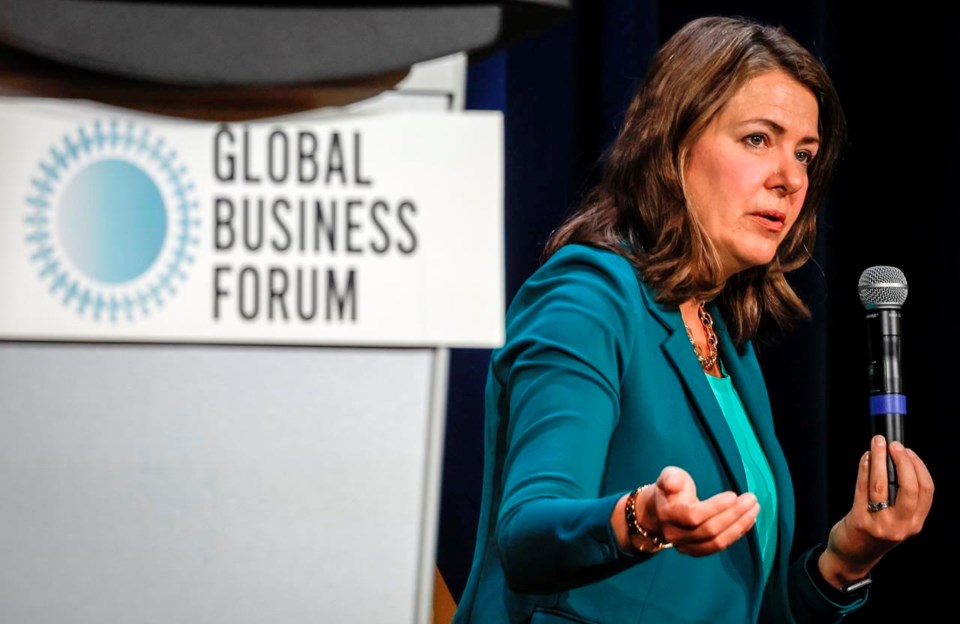CALGARY — More than 50 Alberta CEOs, entrepreneurs and industry leaders are in Ottawa this week in an effort to raise the profile of their province and promote "collaboration" on issues related to energy, climate and the economy.
Led by a consortium of Alberta economic development agencies, chambers of commerce and policy organizations, the delegation includes executives from some of the province's biggest corporations as well as startups from a range of industries.
Organizers say it is the largest business delegation to Ottawa from Alberta in recent memory. The group — which has dubbed itself the "One Alberta, One Canada" delegation — has meetings and events scheduled with a number of cabinet ministers, and Prime Minister Justin Trudeau addressed the delegation at an evening reception.
"I don't know the last time I ever recall this big a group of executives and companies coming to Ottawa," said Cenovus Energy executive chair Alex Pourbaix, a member of the delegation, in an interview from Ottawa Tuesday.
"We're first trying to educate people out here about the diversity of businesses and opportunity in Alberta — and on top of that, you know, there are a lot of issues at play right now."
The business leaders' trip to Ottawa comes amid souring relations between Alberta's UCP government and the federal Liberals.
Alberta Premier Danielle Smith has threatened to use the province's Sovereignty Act to challenge the federal government's clean electricity regulations. She also caused a national stir recently by detailing how the province could exit the Canada Pension Plan.
This week, Alberta government-funded ads about the perceived risks of federal emissions reduction policies rolled out across a number of markets — including in Ottawa, where the province has paid to plaster trucks with banner ads warning passersby that the federal plan will lead to higher electricity bills.
In his speech to the Alberta delegation Tuesday evening, Trudeau said there are politicians who "would rather rile up people's anxieties" than focus on what can be done for the environment and the economy.
But he said he believes Alberta companies and entrepreneurs will be a key role in leading the energy innovations Canada needs to grow a low-carbon economy.
"I know that politics and other challenges have us divided, or people pointing out differences," Trudeau said.
"The fact of the matter is, we don't build the right future for Canada if Alberta isn't at the centre of everything we do."
Pourbaix said Alberta's business leaders are keen to focus on policy, rather than "the political issues that could work more to separate us than bring us together.
"Albertans are all in on Canada," he said.
"We share a lot of the aspirations of the federal government when it comes to decarbonization ... but we have to have very, very thoughtful discussions about the pace of that, and the impact on Canadians in terms of what it is going to mean to our cost of living, and what it is going to mean to our quality of life."
Alberta — which gets most of its electricity from natural gas-fired power plants — has objected to Ottawa's stated goal to get Canada to a net-zero electricity grid by 2035, arguing that time frame isn't achievable without putting reliability and affordability at risk.
The province is also strongly opposed to the federal government's promised cap on emissions from the oil and gas sector, which is expected to be unveiled soon.
But many of the province's biggest companies are also seeking federal help with their own emissions-reduction plans.
Pourbaix, for example, through his role with Cenovus, is heavily involved in the Pathways Alliance — a group of Alberta oilsands companies which has been lobbying the federal government for financial and policy support for a proposed massive carbon capture and storage network to help reduce emissions from Canada's oil industry.
Alberta is also seeking to raise the profile of its fast-growing tech sector and attract more skilled labour to the province. Statistics Canada data released last week showed the province's population grew by 4.1 per cent in the 12 months prior to July 1 — a faster clip than anywhere else in the country.
The provincial government's ongoing "Alberta is Calling" ad campaign aims to entice Canadians from other parts of the country to move to the western province.
Nicole Janssen, the co-founder of Edmonton-based artificial intelligence company AltaML, said while the province is known for its oil and gas industry, it also has emerging strengths in AI, biotechnology, low-carbon energy and more.
"We just really wanted to bring all of those industries together and come to Ottawa and say, 'You know, it's important for all of Canada that Alberta live up to its full potential,'" she said.
She added the business leaders aren't there to speak for or against the provincial government, but rather to "build relationships and work on collaboration."
"We felt like this was a real opportunity that doesn't necessarily have anything to do with how Danielle Smith is or is not handling the situation with the federal government," Janssen said.
"We just need to be present in Ottawa, because it's important that we're all a part of growing the prosperity of Canada together."
Also in his speech Tuesday, Trudeau discussed regional differences with an apparent reference to Premier Danielle Smith’s recently outlined proposal detailing how Alberta could exit the Canada Pension Plan.
“There’s a lot of chatter about differences between regions of Canada. At the end of the day, we’re all Canadians,” Trudeau said.
He adding that his government has worked to strengthen the Canada Pension Plan and believes “we need to make sure it continues to provide a stable and dignified retirement for all Canadians.”
This report by The Canadian Press was first published Oct. 3, 2023.
Amanda Stephenson, The Canadian Press



